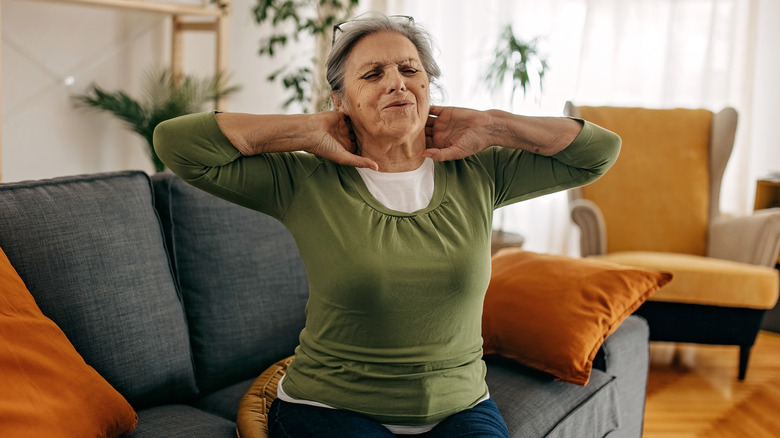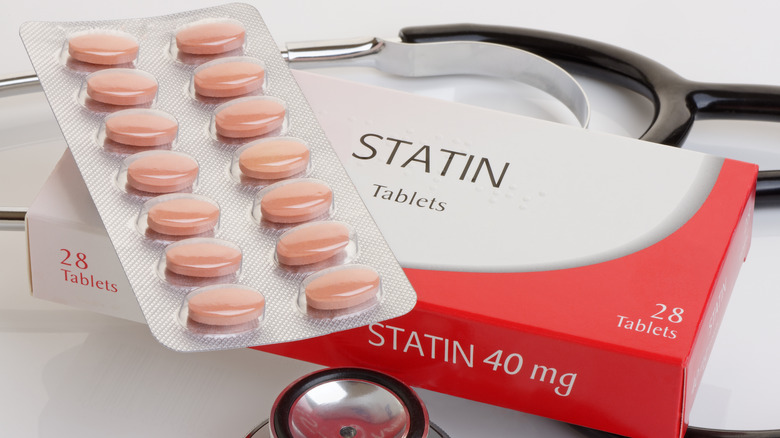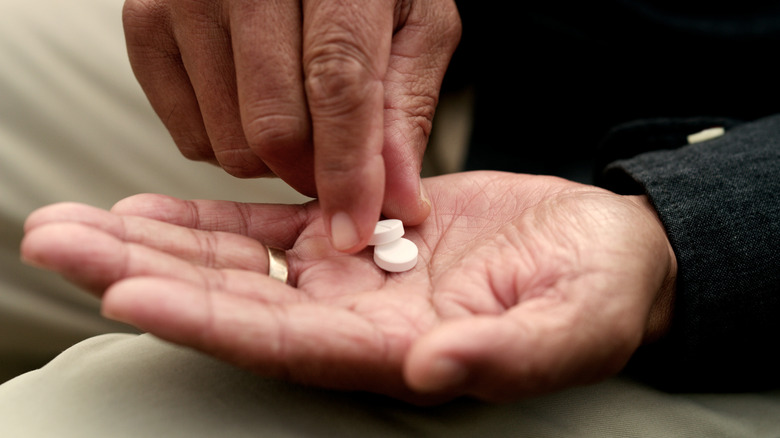What It Means When Your Medication Gives You The Body Aches
We often think of body aches in the context of illness. Lyme disease, mononucleosis, or a cold or fever can all induce the unpleasantness of body aches (via Prevention). Otherwise referred to as myalgias, experts at Baylor Scott & White Health explain that the muscle soreness that characterizes body aches is actually a good sign that your body is on the mend when sick.
Alternatively, your body aches may be the result of muscle damage or overuse, such as adding too much weight to your barbell or exhausting your thumb from sending one too many texts that day. In a small number of cases, muscle soreness may be related to medication use — more specifically, statins (via Mayo Clinic). Statins are used to manage hypertension as well as reduce one's risk of heart problems. Lipitor, Crestor, and Zocor are a few examples of such medications. Known side effects include digestive issues and brain fog, yet approximately 30% of patients report being affected by muscle soreness or weakness.
Statins may cause mild body aches during the first year of treatment
With so many complaints of body aches, researchers from a 2022 study published in The Lancet took an in-depth look at the causes of patient muscle aches and whether they could truly be traced to the medication. In analyzing data from 23 different clinical trials, the study team found that the majority of body-ache cases were not actually due to statin use. While it was found that statins did yield a 7% increase in patient muscle symptoms, this link was observed mostly within the first year of treatment, and the discomfort was usually mild. Patients who reported the development of muscle aches beyond the first year of treatment were predominantly prescribed more intensive statin therapy. Overall, more than 90% of muscle-ache cases were found to be unrelated to statin use.
Commenting on these findings, joint lead author on the study professor Colin Baigent told the University of Oxford, "Our research shows that, for most people taking a statin, any muscle-related symptoms they experience will not in fact be due to the statin itself – and so the potential benefits of statin therapy are likely to outweigh the muscle pain risks." Baigent went on to add that any studies indicating statins to be the definitive cause of body aches are likely flawed in design.
You may be experiencing the nocebo effect
So what does it mean if your statin medication is giving you body aches? As we've seen, it may mean that you're experiencing a real side effect of the drug. In most cases, however, it likely means that you're experiencing what the Mayo Clinic describes as the "nocebo effect." The nocebo effect is not unlike the placebo effect, in which a person anticipates a certain reaction to a medication or treatment, and it ends up being a self-fulfilling prophecy due to the person's firm belief that it will occur even if the drug is not actually producing the anticipated side effect.
In cases of the nocebo effect, a larger-than-usual number of patients report experiencing an anticipated negative drug side effect that contradicts established prevalence rates. In actuality, experts state that a person has an approximately 5% chance of developing statin-related muscle aches in comparison to a placebo drug.
An extremely rare side effect of statin use is called rhabdomyolysis, in which a person experiences severe muscle damage that can be fatal. Most often, this is due to high dosage amounts or negative interactions with other specific medications. But again, the chances of developing the condition are exceedingly slim. Be sure to talk to your doctor if you are taking statins and experience body aches or any other symptoms, as the dosage may need to be adjusted.



